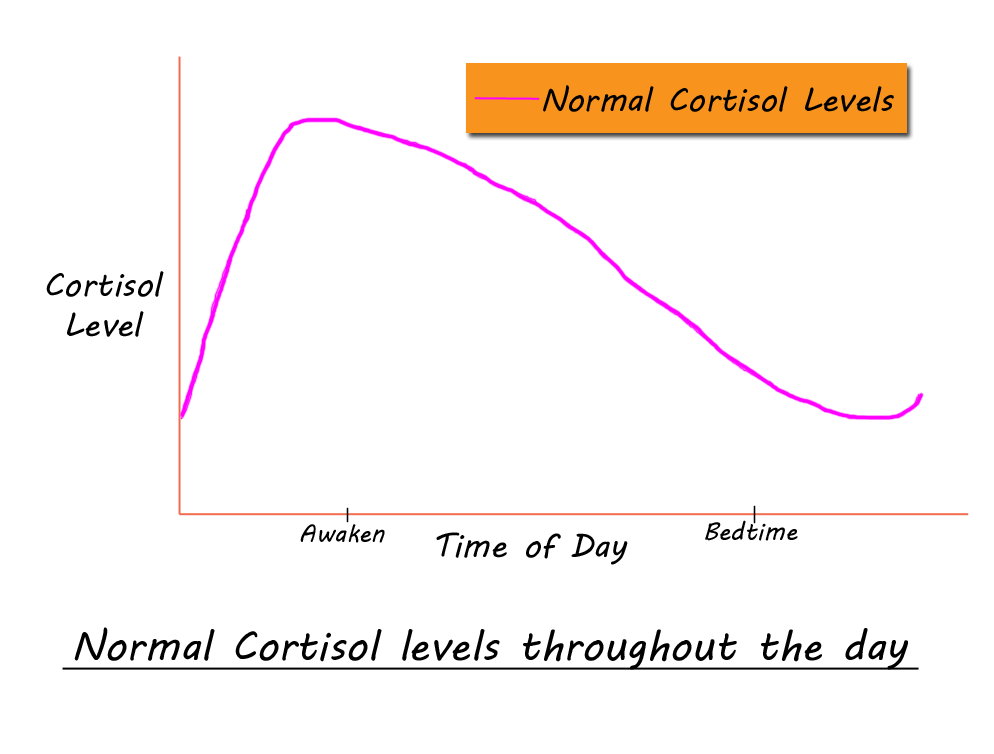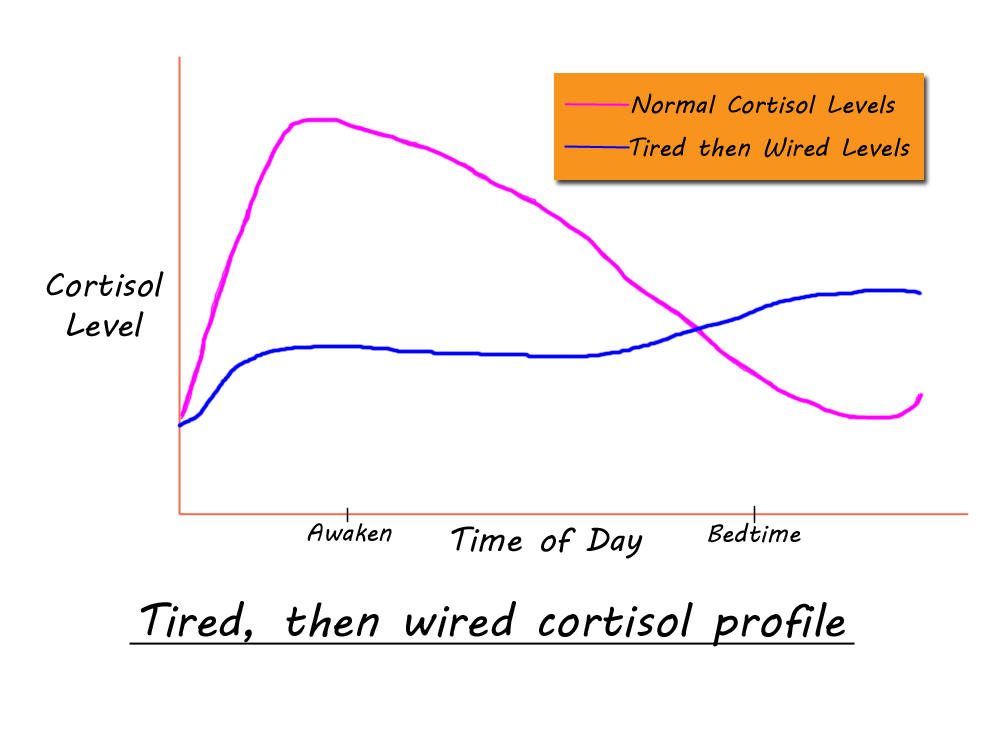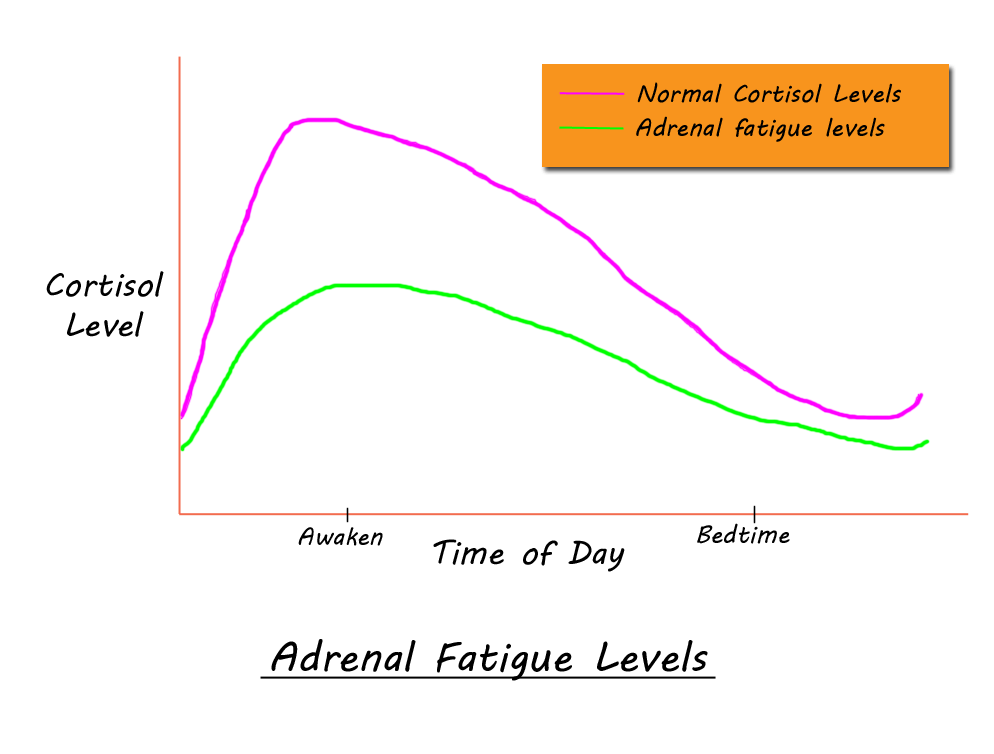Anxiety? Fatigue? Weight gain? Low libido? Insomnia? You may be experiencing a cortisol conundrum.
Coritsol/Adrenal Health
There are many causes for fatigue. I will discuss one here that is often missed by healthcare practitioners. If you want more information on all causes of fatigue, visit my fatigue blog.
Imagine you are driving when a car suddenly veers into your lane. You swerve and apply the brakes. You barely avoid colliding with the car. Your heart is racing and you are breathing quickly. You are very awake and aware of what is going on around you. Your stomach has stopped digesting that Big Mac, and blood flow has been sent to your muscles. You are having a “fight or flight” response.
Your body starts the “fight or flight” response in response to a threat. For the first minute or two, the “fight or flight” response is controlled by adrenalin. But then, your body pumps a hormone called cortisol from the adrenal gland. Cortisol is needed for your body to function normally, but in addition, it helps the body to deal with the immediate threat by:
- Gives energy by turning fat and protein storage into sugar to give energy.
- Increases blood flow by strengthening heart contractions and regulating blood pressure.
- Primes the immune system to repair damage.
- Increases focus and mental clarity by increasing electrical activity in the brain.
- Diverts blood flow to vital areas, away from the digestive tract and to the brain, muscles, and heart.

These are all great things and they are very important when physically threatened. The human body releases cortisol in response to all types of threats: physical, emotional, and mental. When the threat is emotional or mental, the body does not need all these things to occur. What happens if the emotional, mental, or physical stress keeps occurring? Then you continue to make cortisol. Your body may function in a high cortisol state for some time or, if the stress is too great, it may go into “Adrenal Dysfunction.”
What happens when my body is chronically high in cortisol?
For your body to make cortisol, it “robs” ingredients that your body would normally use to make other hormones like progesterone, Aldosterone, DHEA, and testosterone. Because of the effects of cortisol itself, and the effects of these hormones being decreased, you may experience like these:
- anxiety
- decreased libido
- foggy thinking
- insomnia
- weight gain
- high blood pressure
- hot flashes
- night sweats
- depression
- diabetes
- PMS
- irritable bowel
- decrease in thyroid activity (hair loss, feeling cold, fatigue, constipation)
Often, your body continues in this high cortisol state until it can’t continue anymore. Then, we see a progression to adrenal dysfunction.
What is Adrenal Dysfunction?
We always have some cortisol begin secreted. This cortisol follows a “circadian” rhythm that repeats each day. Cortisol is low while sleeping and increases shortly before your normal wake up time. Then, it slowly decreases throughout the day until bedtime, when it is low again.

When cortisol has been inflated because of chronic stress, sometimes your adrenal gland starts to malfunction. Instead of secreting a lot of cortisol in the morning, it only secretes a small amount. Then, the stresses of the day stimulate cortisol production and the cortisol ends up being high at night. Some people call this “tired then wired.” You would typically be very tired all morning and afternoon, then get a little energy around dinner time and not be able to settle down to sleep at night.

Another type of adrenal dysfunction occurs when the adrenal gland secretes only small amounts of cortisol all day long. You would typically be tired all day long. Small simple tasks would seem overwhelming.

Often with both of these types of adrenal dysfunction, symptoms that were occurring in the high cortisol phase persist.
How do I know if Adrenal Dysfunction is my problem?
A diagnosis of Adrenal Disorders is made on the basis of symptoms and saliva cortisol testing. Other disorders, such as thyroid problems or candidiasis can also cause some of the same symptoms. I would love to help you*.
How can I treat adrenal fatigue?
It is all about you. You have the power to heal yourself.
Hear are some suggestions that can help you to heal:
Food Low blood sugar stimulates cortisol production, making the problem worse. Non-starchy colorful vegetables are incredibly powerful in healing the body. Can you get 5-6 servings a day? Try to eat a protein or a non-starchy vegetable before any starchy food (rice, potatoes, corn, grains, pasta). Try to avoid sugar and white flour. If you are waking in the middle of the night, try eating a bedtime protein snack. Before eating, take some deep, relaxing breaths, and chew your food thoroughly while sitting down to eat.
Sleep- Eight hours of sleep per night is the best. Try to go to bed and get up at the same time each day, even weekends. If you are having trouble getting to sleep, I can recommend some helpful techniques for you.
Nutritionals-The third is to give your body the supplemental support it needs. I would love to meet with you and talk about the best regimen for you to heal.
Other aspects of treatment involve getting an appropriate amount of exercise for what your adrenal function is, and checking for environmental and food allergies that may be causing stress.*
The most important aspect of healing involves changing how you react to and deal with stress.
Would you like a plan for beating your fatigue and exhaustion?
Click here to find out how to make an appointment for in-person or telehealth visit where we will formulate a plan for testing and therapy to help you have energy again!